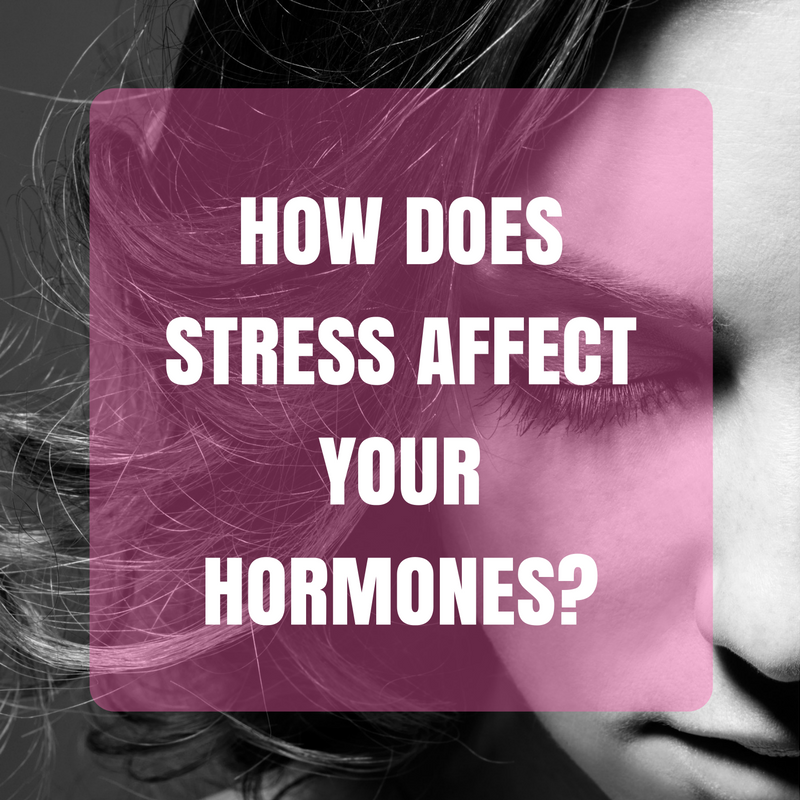 Stress can have a huge impact on your hormones. Changes in production of stress hormones can put the rest of your hormones out of balance. Rising cortisol levels which occur during the fight or flight stage of the stress response, can stop your body from releasing luteinizing hormone, ovarian estrogen and progesterone. This can even cause your period to stop. This is called hypothalamic amenorrhoea and is the reason you can miss periods during times of physical or emotional stress. Stress can also act as the initial trigger that activates autoimmune conditions like Hashimoto’s Disease which affect thyroid hormone production. Click here to read more about your thyroid.
Stress can have a huge impact on your hormones. Changes in production of stress hormones can put the rest of your hormones out of balance. Rising cortisol levels which occur during the fight or flight stage of the stress response, can stop your body from releasing luteinizing hormone, ovarian estrogen and progesterone. This can even cause your period to stop. This is called hypothalamic amenorrhoea and is the reason you can miss periods during times of physical or emotional stress. Stress can also act as the initial trigger that activates autoimmune conditions like Hashimoto’s Disease which affect thyroid hormone production. Click here to read more about your thyroid.
Book a Consultation with Naturopath Emma Stimpson
Stress and PMS
It’s a vicious cycle. When you feel stressed, it puts your other hormones out of whack. When these hormones get out of balance, you can feel even more stressed. This is a common problem for women who have PMS.
Brain Fog
Brain fog often occurs in conjunction with hormonal changes. Supporting the body’s stress response is a crucial step that can help you can think clearly again. Addressing stress is such an important part of balancing your hormones naturally and getting your vitality back. And of course, we all want to feel balanced emotionally so that we can enjoy peace of mind.
Stress and Peri-Menopause
There is a strong link between stress and peri-menopausal symptoms. The brain is an important target for stress hormones, so it’s not surprising that many of the symptoms you might experience during peri-menopause are neurological. This can include depression, anxiety, insomnia, poor concentration and hot flushes. Hot flushes occur when stress hormones increase at the same time as estrogen and progesterone decrease. These hormonal changes act on the hypothalamus to lower your body’s temperature thermostat. Registering this lowered set point triggers hot flushes and sweating, followed by feeling colder than usual, often many times each day. If you want to stop your hot flushes and night sweats, along with soothing irritability and improving mental focus, it is extremely important to support your body’s stress response.
What would you do if you faced a wild tiger?
What would you do if you faced a wild tiger or some other predator? Well, back in our cave woman days, you may have had to deal with this form of stress. To ensure your survival, you would have had to run fast or put up an almighty fight and your body would have activated its fight or flight response.
In modern times we don’t face animal predators trying to make a meal of us. However we do face other forms of stress which will activate the same fight or flight response in our bodies. The tiger is in the form of work stress, relationship stress, family stress and traffic jams, just to name a few.
The Fight or Flight Response
During the fight or flight response, your body sends out chemical messengers to allow you to either fight off the stress or run away from it. These chemicals increase blood flow to your brain, heart, lungs and muscles so that you can run fast! Cortisol also increases the amount of sugar released into your blood so that you can feed those racing muscles. During this time, as reproductive and digestive functions are unimportant, they are suppressed. Once the stress is over these chemical messengers return to normal and balance is restored.
This fight or flight response is not a problem unless it does not switch off, as in the case of chronic stress.
Resistance Phase
In chronic stress, you adapt to the stress you are facing. It can start to feel “normal” to be functioning at this level, even though your physiological processes are compromised. This is called the resistance phase of the stress response. It is possible to cycle between fight or flight and the resistance phase of the stress response for a prolonged period of time.
Exhaustion Phase
Eventually however you end up in the exhaustion phase of the stress response. In this phase, you feel utterly exhausted, physically and emotionally. Your adrenal reserves are low and you are no longer able to pump out such high levels of cortisol in response to stress. Even if you are faced by a “wild tiger”, you feel nothing – no increase in heart rate, no anxiety, no butterflies in the stomach – you just feel flat. Because of the effect of the stress hormones on your immune system, this is a time that genetic susceptibility to other health conditions may also be triggered. You might also get recurrent colds or flus.
The Effects of Chronic Stress
The stress response may have been a great adaptation for us hundreds of years ago, but unfortunately the effects of chronic stress can impact our health significantly. Chronic ongoing stress can alter the delicate balance within our body. Stress especially affects the heart and cardiovascular system, weakens digestion, depletes energy levels, upsets blood sugar regulation and hormonal balance, and may disturb sleep and mental health. Therefore, we need to manage stress and our response to stressful situations to ensure balance and health.
How to Balance Your Stress Hormones Naturally
Fortunately there are some excellent options to help you manage stress naturally. Each person reacts to stress differently and you might need to choose different herbs, therapies or nutrients to get the best results. Essential oils are a wonderful treatment for most women who are stuck in the stress cycle. They are safe to use externally and can be used in conjunction with other therapies and medications. Aromatherapy using essential oils is a simple and natural way to nurture your-self every day of the year, but especially on those most difficult PMS or peri-menopausal days.
Yours in Health,
Book a Consultation with Naturopath Emma Stimpson


 At the age of 45 I started getting migraine headaches, stomach cramps, mood swings plus feelings of illness and sight issues prior to my periods. This had been happening for about six months before I consulted with naturopath Emma Stimpson....
At the age of 45 I started getting migraine headaches, stomach cramps, mood swings plus feelings of illness and sight issues prior to my periods. This had been happening for about six months before I consulted with naturopath Emma Stimpson....
Book Online
Phone: (03) 5986 5170
687 Point Nepean Rd, McCrae, Vic, 3938, AUS
(Located at Seaside Osteo)